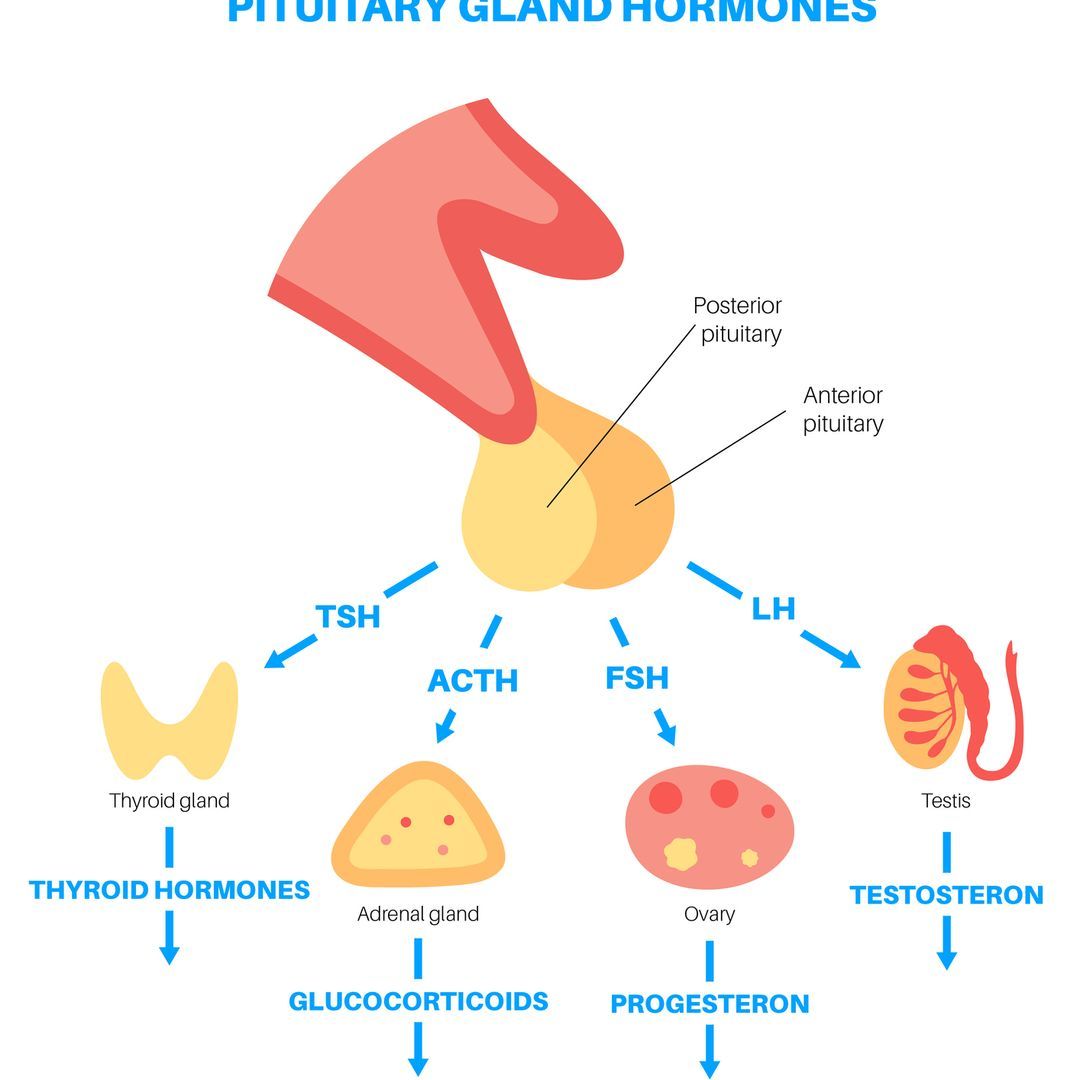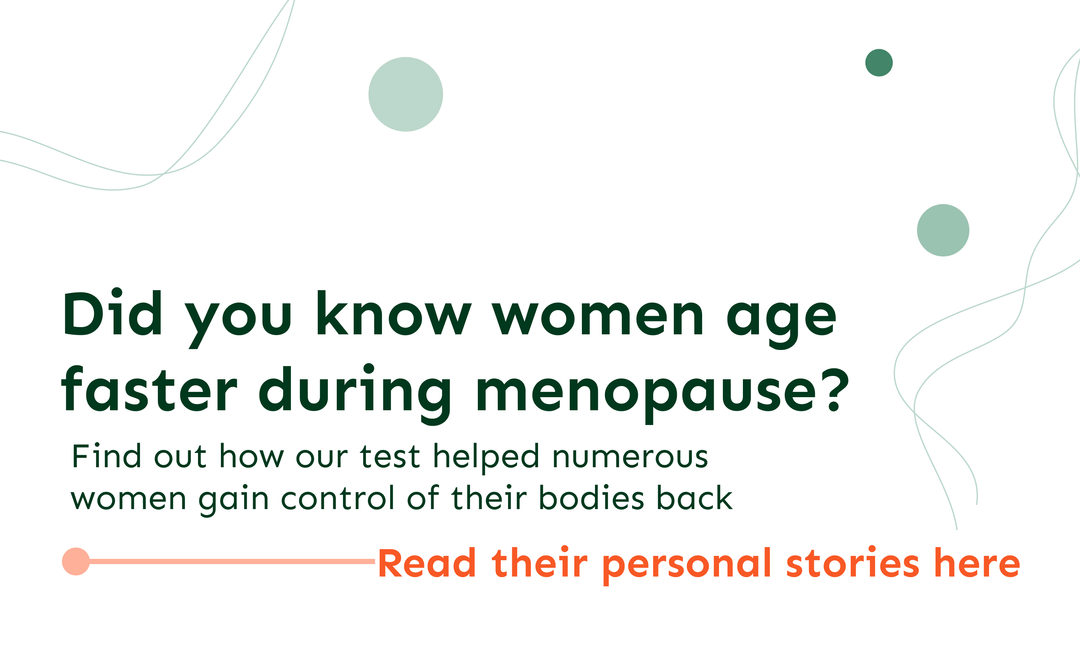The Signs Perimenopause is Ending
What are the first signs of perimenopause? What are the signs perimenopause is ending? Learn how long you can expect perimenopause to last before entering the next stage of menopause.

By The GlycanAge Team
Menopause is a natural part of ageing and happens when a woman stops having her period, usually between the ages of 45 and 55. For some women, menopause can occur earlier, and if this happens before you are 40, it is called premature menopause (otherwise known as premature ovarian insufficiency).
In the run-up to menopause, women go through a phase called perimenopause. This can last a few months or for several years. During perimenopause, there can be many uncomfortable symptoms as oestrogen levels begin to fall. Common symptoms include hot flashes, mood changes, joint and muscle pain, and vaginal dryness.
For some women, symptoms during perimenopause can be mild or even non-existent, while for others, it can significantly impact their daily lives. As menopause is not a disease and is an entirely natural phase of female ageing, most will not need medical tests, but some will need or want a blood test to confirm their hormone levels. This article explains why a woman may need a menopause test and what can be expected.

Every woman is different, and their experience of menopausal systems will vary hugely. Some will find it has little impact on their lives, while for others, it can turn their whole world upside down. If menopausal or perimenopausal symptoms have a significant adverse effect, there are menopause tests available to help determine the best course of treatment.
There are some circumstances when a woman may be way below the expected age to start perimenopause, but they are experiencing several associated symptoms. For example, thyroid disease can mimic perimenopause symptoms, so a menopause test could help identify the condition.
In other situations, menopause tests are sometimes carried out to check specific hormone levels. This is especially relevant for those experiencing fertility difficulties or when periods have stopped at an early age.
Some experts can be a little dubious of testing for confirming perimenopause or menopause as hormone levels change throughout the menstrual cycle. However, there is a joint opinion that when a woman suspects menopause, it is an excellent time to complete a comprehensive body and lifestyle examination.
One of the best ways to start your wellness assessment is to complete a biological age test by analysing glycans. These sugar molecules hugely influence your biology and are regulated by your genes, environment and lifestyle choices. By taking a GlycanAge biological age test, you can assess your current lifestyle and get the necessary information to improve your routines.

There are a few ways women can test for menopause. Some like to try a salivary hormone level test, but these are expensive and inaccurate. The most accurate test currently available is a blood test which checks FSH menopause levels.
FSH (short for follicle stimulating hormone) is a stimulating hormone produced by the pituitary gland, located on the underside of the brain. There are two ways to perform an FSH test:
The results of FSH are in milli-international units per millilitre (mIU/ML). A normal value range will vary depending on the woman’s age. Women still menstruating will have FSH levels of 4.7 to 21.5 mIU/ML. When post menopause, the FSH readings will likely be 25.8 to 134.8 mIU/ML. If testing to discover whether you are menopausal, the FSH blood level will likely need to be consistently elevated to 30 mIU/ML or higher, and you would not have had a period for 12 months.
A single FSH level can be misleading during perimenopause as oestrogen production does not steadily fall from day to day. Your FSH and oestrogen levels can fluctuate significantly, so one elevated reading is not enough to confirm menopause accurately. In addition, a low FSH reading when a woman is experiencing some extreme hot flashes or infrequent periods does not eliminate the possibility of being caused by perimenopause. FSH tests are also not valid when taking particular hormone therapies – such as for women on birth control pills.
Over-the-counter menopause home testing kits are also available, but these are expensive and often not informative for the same reasons discussed above. Homes tests can detect FSH most of the time, but they do not determine whether a person is experiencing menopause. You will likely need multiple FSH blood tests for a more accurate reading, and doing this via a menopause home testing kit is very expensive and may not be correct.

If you believe you are going through perimenopause or a healthcare professional has confirmed your FSH blood levels are consistently high, there are ways to manage symptoms. The first step is to review your lifestyle and make appropriate changes to ensure you are eating well, exercising and looking after your general wellbeing. This can help with symptoms during perimenopause, menopause, and the post-menopause years.
When at-home treatments, such as getting plenty of rest and wearing light clothing during hot flashes, are not working, there are some medical treatments. The main option offered to women is hormone replacement therapy (HRT). This treatment involved using oestrogen to replace your body’s own levels around the time of menopause. There are several types and doses of HRT, so there can be some trial and error to find the best solution for you.
Oestrogen can come in various forms, including skin patches, tablets, implants, and gels or sprays, which are topically applied. If you have a uterus, you will additionally have to take progesterone to protect your womb lining from the effects of oestrogen. It is known as HRT when taking a combination of oestrogen and progesterone at the same time.
Some non-hormonal treatments are available if you cannot have HRT and choose not to. For example, some women have discovered cognitive behavioural therapy (CBT) to be incredibly helpful for managing low mood and anxiety brought on by menopause and perimenopause. Some have even found the talking therapy CBT to help with physical symptoms like joint pain and hot flashes.

Menopause can be difficult to diagnose prior to 12 months post menstruation. There are tests like FSH, which can indicate whether menopause is likely the cause of some symptoms like mood changes and hot flashes, but due to the fluctuation in FSH, results are not always accurate. However, this does not imply that women ought to suffer during suspected perimenopause, and there are a lot of treatments out there that can be applied to help alleviate discomfort.
During this time of attunement and change, it can be the perfect opportunity to assess your overall lifestyle and check your biological age. You can then make any essential changes to ensure your ageing journey can be as enjoyable and youthful as possible.
Tests are not routinely carried out to determine whether you are in menopause or not. However, there may be some circumstances when a blood test is offered, and this will likely be one to check the elevated follicle-stimulating hormone (FSH) levels. When a woman has not had a period for 12 months and has an elevated FSH level of 30 mIU/ML or higher, it is generally agreed she has reached menopause.
It is possible to test your FSH levels using a home test kit, but it will not determine whether you are experiencing menopause. As females age, their FSH levels can increase and decrease during menstruation, so a one-off test will not provide an accurate conclusion.
For women, FSH helps manage the menstrual cycle and stimulates the ovaries to produce eggs. An FSH test to determine the levels can help diagnose or evaluate menopause, polycystic ovary syndrome and ovarian cysts.
The first signs of menopause include hot flushes, night sweats, changes in mood, vaginal dryness, reduced libido, and problems concentrating or mild memory loss. Some women may find symptoms get in the way of their daily lives, while others experience very mild or no signs, making determining the early stages of menopause very hard.
To confirm you have reached menopause, you will need to not have any menstrual bleeding (including spotting) for 12 months in a row. On the other hand, determining if you are experiencing perimenopause is much more difficult, especially if you have mild or no symptoms. As a result, many women keep an eye on the calendar and wait 12 months until they are sure all periods have stopped.
https://glycanage.com/science/
https://glycanage.com/price-and-plans/
https://journals.sagepub.com/doi/full/10.1177/0004563217706381
https://www.ncbi.nlm.nih.gov/pmc/articles/PMC6992500/
https://www.uptodate.com/contents/clinical-manifestations-and-diagnosis-of-menopause
https://www.ncbi.nlm.nih.gov/pmc/articles/PMC6317580/
https://www.ncbi.nlm.nih.gov/pmc/articles/PMC8453849/
https://academic.oup.com/aje/article/187/1/16/3860089
YouTube Video Link: https://www.youtube.com/watch?v=bgfnPKi2Rx4

By The GlycanAge Team

Start or continue your GlycanAge journey
Don’t be afraid to reach out to us and ask questions, provide commentary or suggest topics.
Other articles you may like:
What are the first signs of perimenopause? What are the signs perimenopause is ending? Learn how long you can expect perimenopause to last before entering the next stage of menopause.
 By The GlycanAge Team
By The GlycanAge TeamMenopause is the natural transition of the time menstrual cycles end. It is confirmed once 12 months have passed since your last period. However, the transition and symptoms connected with menopause can have a detrimental effect on daily life and can last for several years.
 By The GlycanAge Team
By The GlycanAge Team